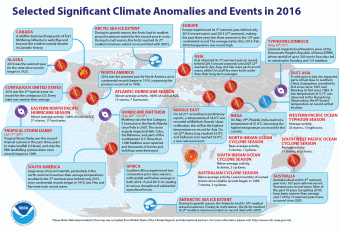 The World Meteorological Organization (WMO) yesterday announced that the year 2016 has been the hottest year on record, surpassing the exceptionally high temperatures of 2015, according to a consolidated analysis.
The World Meteorological Organization (WMO) yesterday announced that the year 2016 has been the hottest year on record, surpassing the exceptionally high temperatures of 2015, according to a consolidated analysis.
The globally averaged temperature in 2016 was about 1.1°C higher than the pre-industrial period. It was approximately 0.83° Celsius above the long term average (14°C) of the WMO 1961-1990 reference period, and about 0.07°C warmer than the previous record set in 2015.
WMO uses data from the US National Oceanic and Atmospheric Administration, NASA’s Goddard Institute for Space Studies and the UK’s Met Office Hadley Centre and the University of East Anglia’s Climatic Research Unit. WMO also draws on reanalysis data from the European Centre for Medium Range Weather Forecasts and the Copernicus Climate Change Service, which use a weather forecasting system to combine many sources of data to provide a more complete picture of global temperatures, including in Polar regions.
“2016 was an extreme year for the global climate and stands out as the hottest year on record,” said WMO Secretary-General Petteri Taalas. “But temperatures only tell part of the story.”
Throughout 2016, there were many extreme weather events which caused huge socio-economic disruption and losses. Record ocean heat contributed to widespread coral reef bleaching.
WMO’s final statement on the global climate in 2016, which includes full details of regional and national temperatures, extreme events, sea level rise and tropical cyclones, will be published in March 2017. The annual climate reports monitor natural year-to-year variations in the climate as well as long-term climate change due to human activities and serve as a tool to inform decision makers about the need both to control and to adapt to climate change.
Source: public.wmo.int
